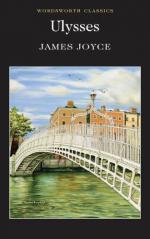—I hope Mr Dedalus will work out his theory for the enlightenment of the public. And we ought to mention another Irish commentator, Mr George Bernard Shaw. Nor should we forget Mr Frank Harris. His articles on Shakespeare in the Saturday review were surely brilliant. Oddly enough he too draws for us an unhappy relation with the dark lady of the sonnets. The favoured rival is William Herbert, earl of Pembroke. I own that if the poet must be rejected such a rejection would seem more in harmony with—what shall I say?—our notions of what ought not to have been.
Felicitously he ceased and held a meek head among them, auk’s egg, prize of their fray.
He thous and thees her with grave husbandwords. Dost love, Miriam? Dost love thy man?
—That may be too, Stephen said. There’s a saying of Goethe’s which Mr Magee likes to quote. Beware of what you wish for in youth because you will get it in middle life. Why does he send to one who is a BUONAROBA, a bay where all men ride, a maid of honour with a scandalous girlhood, a lordling to woo for him? He was himself a lord of language and had made himself a coistrel gentleman and he had written Romeo and Juliet. Why? Belief in himself has been untimely killed. He was overborne in a cornfield first (ryefield, I should say) and he will never be a victor in his own eyes after nor play victoriously the game of laugh and lie down. Assumed dongiovannism will not save him. No later undoing will undo the first undoing. The tusk of the boar has wounded him there where love lies ableeding. If the shrew is worsted yet there remains to her woman’s invisible weapon. There is, I feel in the words, some goad of the flesh driving him into a new passion, a darker shadow of the first, darkening even his own understanding of himself. A like fate awaits him and the two rages commingle in a whirlpool.
They list. And in the porches of their ears I pour.
—The soul has been before stricken mortally, a poison poured in the porch of a sleeping ear. But those who are done to death in sleep cannot know the manner of their quell unless their Creator endow their souls with that knowledge in the life to come. The poisoning and the beast with two backs that urged it King Hamlet’s ghost could not know of were he not endowed with knowledge by his creator. That is why the speech (his lean unlovely English) is always turned elsewhere, backward. Ravisher and ravished, what he would but would not, go with him from Lucrece’s bluecircled ivory globes to Imogen’s breast, bare, with its mole cinquespotted. He goes back, weary of the creation he has piled up to hide him from himself, an old dog licking an old sore. But, because loss is his gain, he passes on towards eternity in undiminished personality, untaught by the wisdom he has written or by the laws he has revealed. His beaver is up. He is a ghost, a shadow now, the wind by Elsinore’s rocks or what you will, the sea’s voice, a voice heard only in the heart of him who is the substance of his shadow, the son consubstantial with the father.




